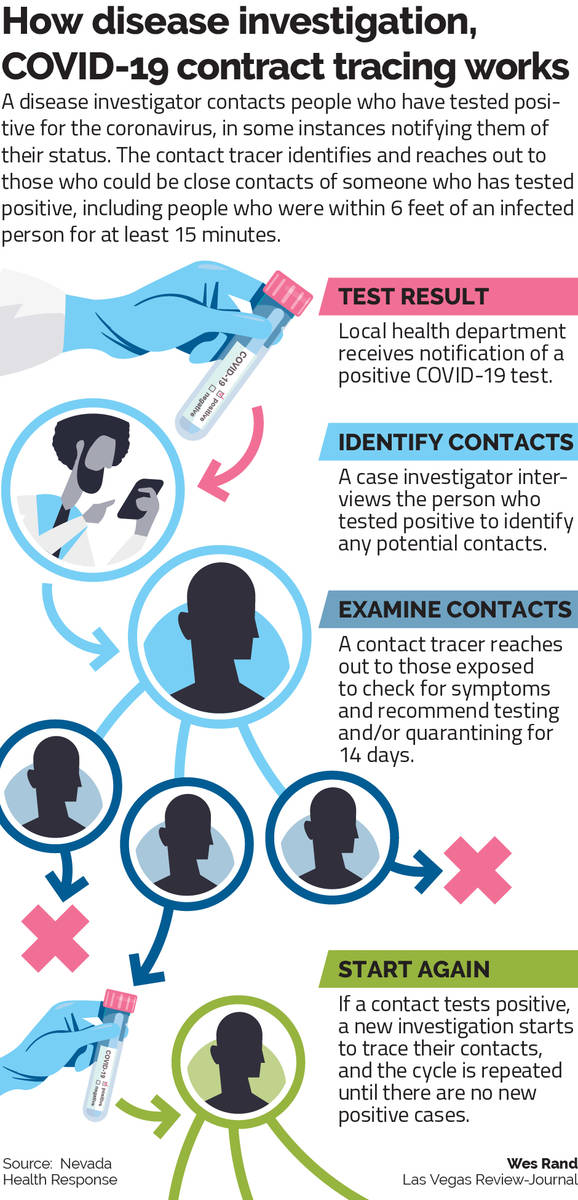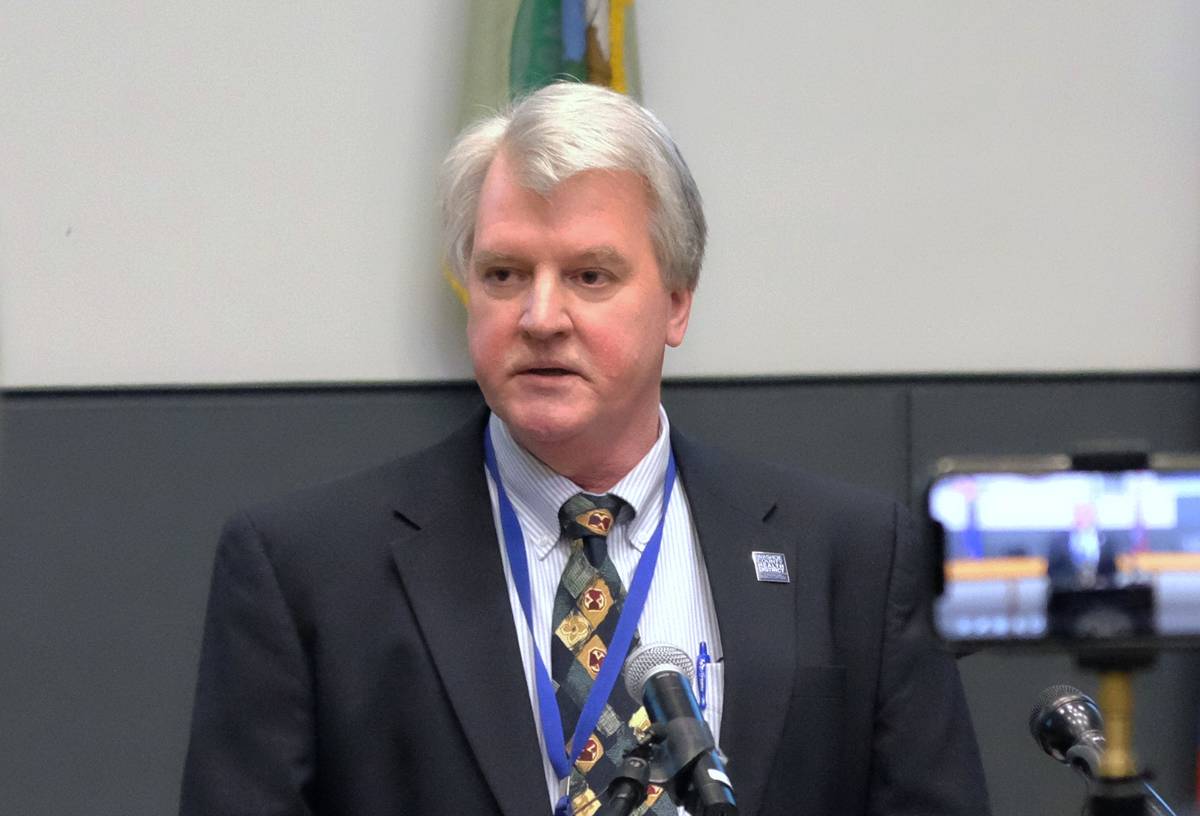COVID investigation tool is data ‘nightmare’ for some Nevada counties
Northern and rural Nevada are facing this winter’s COVID-19 surge with a disease investigation tool that is overwhelmed to the point of malfunctioning, according to local health officials.
The tool, the NEDSS Base System, also known as NBS, has proved adequate in past years, but a daily inundation of COVID-19 data has caused it to run slowly, crash and kick out users at random, say officials with the Washoe County Health District and Carson City Health and Human Services.
The platform is also ill-equipped to collect and store critical disease investigation data — such as where an infected person traveled before and after testing positive — in a way that it can be analyzed.
Local health departments are instead using other software to gather the vital information and then entering it into NBS, a time-consuming solution. The Carson City agency has identified more than 2,800 cases for its jurisdiction covering four counties, and Washoe County has identified more than 20,000.
“It becomes a data management nightmare,” CCHHS disease control and prevention manager Dustin Boothe said of the process.
Washoe County health officer Kevin Dick, whose jurisdiction has been hit hardest by Nevada’s ongoing surge, told the state’s COVID-19 task force last week that his department has been “hampered by the lack of a good electronic data management platform that could be used.”
During the summer’s COVID-19 wave, state officials announced that by early fall they would replace the NBS with a statewide platform that would connect Nevada’s 17 counties for the first time.
Officials had planned to modify Salesforce contact tracing software, acquired by Nevada in June for $1 million, to also cover disease investigation. The platform fell short of expectations during test runs.
The state now wants to expand Clark County’s open-source disease investigation platform statewide, but switching Nevada’s other counties to the EpiTrax platform probably won’t occur until the end of next summer — at the earliest.
Disease investigation is a crucial part of the public health response to an epidemic. The process involves alerting people they have tested positive for an infectious disease and then interviewing them to determine where they likely caught and then spread it. It’s a pivotal lead-up step to contact tracing, which Nevada officials say is a key strategy to prevent further disease spread.
Unlike the proposed Salesforce software, EpiTrax will be used to investigate all infectious diseases, not just COVID-19. Having a single platform statewide will make it easier to collect, share and analyze data across jurisdictions.
“It requires a click to exchange information,” Southern Nevada Health District disease surveillance supervisor Kimberly Hertin said.
Nevada Department of Health and Human Services deputy administrator Julia Peek said she agrees that the NBS needs to be replaced. However, she said, the current platform has not hindered Nevada’s COVID-19 response.
“As long as the information was actionable in the county that was using it, then it was serving its purpose,” she said. “They had access to the data they needed to respond locally.”
Salesforce falters
In early June, Gov. Steve Sisolak announced Nevada would vastly expand its COVID-19 testing and contact tracing abilities under a new framework.
The state acquired the Salesforce software and signed a $28.4 million contract with Deloitte to hire hundreds of full-time contact tracers. Federal CARES Act relief funds paid for both contracts.
Salesforce worked so well for contact tracing that state officials soon began talks of expanding it.

If one platform could be used for both contact tracing and disease investigation, they reasoned, then Deloitte’s workers could be quickly reallocated from one task to another if needed.
Peek announced in early September that Salesforce would be the state’s disease investigation platform in a matter of weeks. A new survey would bring data standardization to Nevada’s COVID-19 response, allowing for a better understanding of disease trends that would inform the state’s reopening plans.
However, the Salesforce plan fell apart during a test run in northeastern Nevada. Workers reported they were having trouble navigating the tool while investigating cases in Elko, Lander and Eureka counties.
“They had said, ‘Honestly, it’s causing double the amount of time for each investigation,’ and none of us have the luxury for time,” Peek said.
Nevada continues to use Salesforce as its contact tracing tool without complaint, Peek said. Virtually all close contacts are notified to self-quarantine within 24 hours of disease investigators receiving their information.
“They really fulfilled what our expectation was,” Peek said.
Clark County’s system
Nevada has now set its hopes on Clark County’s EpiTrax platform.
EpiTrax is an ongoing upgrade to the county’s longstanding TriSano platform, which Southern Nevada Health District officials say has proved better suited than NBS at handling large amounts of COVID-19 data. At least three other states — Kansas, Missouri and Utah — are already using EpiTrax statewide.
“We’re not creating it from scratch. We’re creating it from a really solid group of states, who found it successful,” said Hertin, the health district’s disease surveillance supervisor.
The existing TriSano platform was not expanded to the rest of the state after Salesforce failed because the Southern Nevada agency was already upgrading to EpiTrax, Hertin said. It would have been a waste of resources to implement TriSano, only to replace it a short time later.
EpiTrax will streamline the COVID-19 disease investigation process by directly importing test data from major labs like Quest Diagnostics and LabCorp. Most patients automatically will receive their COVID-19 test results via text message.
EpiTrax is designed to search automatically for patterns among new cases to help identify potential COVID-19 clusters and super-spreading events. It can also compare patients’ lab results with immunization records, helping the state determine the effectiveness of COVID-19 vaccines.
And because the software is open-source, government officials will not need to pay licensing fees to add new users. Updates to the system, such as adding additional survey questions, can be made at the local level.
Clark County plans to launch EpiTrax locally in January after the health district ensures it can transfer over its existing disease investigation data from TriSano without error.
“It requires a lot of back-end work, so that when we shut off the old system, the new system is working in place, and there’s no negative effect to our community or our delay in disease investigation work,” Hertin said.
It will take state officials months longer to develop the cloud computing infrastructure needed to roll out EpiTrax across Nevada, Peek said. The state must also migrate its existing data too.
“At this point rushing to get it done is not the right solution,” Peek said. “We don’t have a timeline on what that looks like yet.”
Contact Michael Scott Davidson at sdavidson@reviewjournal.com or 702-477-3861. Follow @davidsonlvrj on Twitter.











































